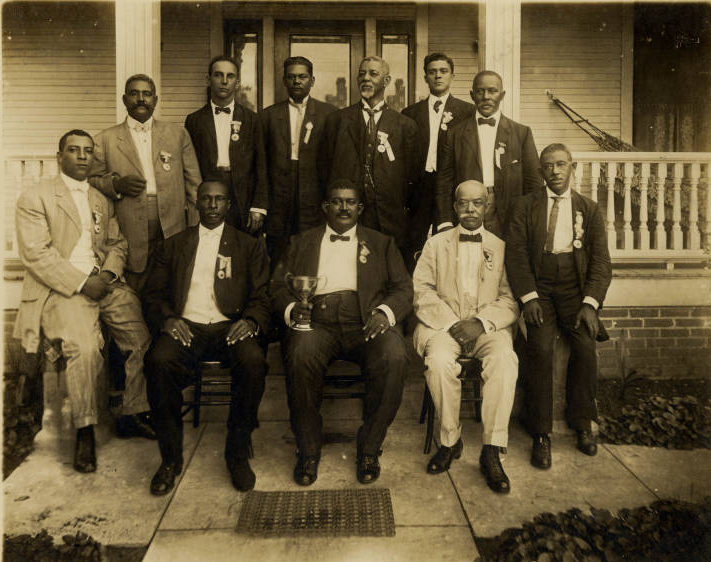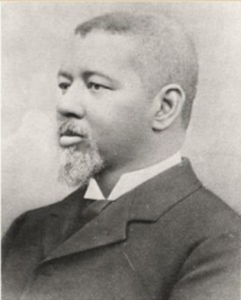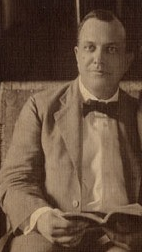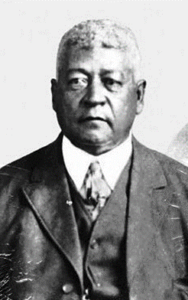
Pictured above are members of the New Orleans chapter of the National Negro Business League in an undated photograph, circa 1917. Eleven men are picture, six standing and five seated. Standing, fourth from left is druggist Aristide Dejoie; sixth from left is grocer Homer M. Charles. Seated, second from left is undertaker Duplain W. Rhodes; third is contractor William E. Roberson; fourth is attorney James Madison Vance; fifth is undertaker Charles Medley.
At the dawn of twentieth century, increased attention was placed on the role of business in the Black community. In 1898, W.E.B. DuBois organized a “Negro in Business” conference at Atlanta University and in August 1900, Booker T. Washington organized the first meeting of the National Negro Business League in Boston. Among the roughly three hundred individuals at that initial meeting were four Louisiana businesspeople, including two women. These delegates were J. T. Henderson, grocer, from Mansfield; M. Connor, gin repairer, from Baton Rouge; Lizzie Reynolds, hotel owner, Shreveport; and “Madame” Mary Catherine Turner, a widowed woman who found success first as agent to a national beauty care company, and later with her own company.
In 1903, the New Orleans chapter of the National Negro Business League was founded by Aristide Dejoie (1847-1917), a druggist and former State Representative. Dejoie was elected the first President of the New Orleans chapter, with P. James Scott as Secretary and H. Thomas Calloway as Corresponding Secretary. During Dejoie’s presidency, the League met in the Colored Y.M.C.A. Building on Dryades Street.

Aristide Dejoie, druggist and former State Representative
The National Negro Business League grew exponentially both in New Orleans and nationally. By the time that its founder and first President, Booker T. Washington, “The Wizard of Tuskegee,” died in 1915, the League had over six hundred chapters in the United States and West Africa. In July 1910, a statewide organization, the Louisiana Negro Business League was formed at the Pythian Temple in New Orleans. The first President was Dr. Robert E. Jones, a Methodist clergyman and editor of the Southwest Christian Advocate. Dr. Jones was succeeded as state president by William E. Roberson, a New Orleans contractor.

Dr. Robert Elijah Jones, editor of the Southwest Christian Advocate; founder of the Gulfside Assembly at Waveland, Mississippi; and later Bishop of the Methodist Episcopal Church.
The League was not merely another social or political organization. It actively encouraged young men and women to enter business and shared the wisdom of established business leaders. Members of the New Orleans chapter read papers at several of the League’s national conventions, for example:
“Plaster Contracting,” – John J. Winston, 1906 Atlanta Convention
“Business Side of the Negro Newspaper,” – Robert E. Jones, 1909 Louisville Convention
“House Demolishing,” – Edward J. Lamothe, 1910 New York Convention
“National Negro Funeral Directors Association,” – Duplain W. Rhodes, 1911 Little Rock Convention

An account of a tour by local and state Business League officials of Black-owned businesses in 1911. Southwestern Christian Advocate (New Orleans, 16 March 1911, p. 8.

Edward Lamothe, contractor and father of Jelly Roll Morton
Upon the death of Aristide Dejoie in 1917, Walter L. Cohen, founder and President of the Peoples Industrial Life Insurance Company, was elected President. In 1927, undertaker Joseph P. Geddes was elected President, along with R. L. Johnson, Secretary; Thomas Carr, Treasurer; and Arnold L. Moss, O.C.W. Taylor, William H. Mitchell, Edward Belfield Spriggins, and Prudhomme Dejoie, Publicity Committee. At that time, the membership of the local chapter numbered well over three hundred.

National Negro Business League members with National President, Dr. Robert R. Moton, February 1929 – First row (seated): Dr. G. Lake Imes, Joseph P. Geddes (undertaker), A.C. Atkins, Walter L. Cohen (political leader & insurance executive), Dr. Robert R. Moton, Bishop I. C. Scott, Albon L. Holsey, Rev. G. W. Alston. Middle row: Dr. Marcus C. Gaines, R. B. Hayes (Dean of New Orleans University), Dr. Percy P. Creuzot (dentist), Dr. L. B. Landry (physician), Rev. D. F. Martinez, James Lewis Jr.(businessman), Rev. E. W. White. Top row: H. L. Williams, Bingaman J. Cohen (insurance agent), Dr. Joseph A. Hardin (physician) Rev. A. J. Mitchell, J. W. Jones, Henry E. Braden, Sr. (owner of Astoria Hotel), P. R. Crutchfield (circulation manager for The Louisiana Weekly).
In February 1929, the League hosted its national President, Dr. Robert R. Moton, who was also President of Tuskegee University [this occasion was covered in a previous post]. Among its later longtime presidents were druggist Dr. Armand V. Boutte and motel owner Ellis Marsalis, Sr. Like so many organizations which were formed during the long Jim Crow era, eventually the Business League ceased to exist, although it was nationally reorganized in 2017 by Dr. Ken Harris of Detroit.
Jari Honora
Sources: Unidentified Photograph, Item XUAP001.01.B.49.003, Archives Photographs Collection, Xavier University of Louisiana Archives. “Want Convention Here,” The New Orleans Item, 30 July 1903, p. 7, col. 3. “Negroes Organize Business League,” The New Orleans Item, 8 July 1910, p. 3, col. 4. “Dr. Jones Defeated for Presidency,” The New Orleans Item, 7 July 1911, p. 13, col. 2. “Colored Y. M. C. A. Does Great Good,” The Times-Picayune, 30 December 1913, p. 31, col. 1. “Aristide Dejoie Passes to Rest,” The Times-Picayune, 22 July 1917, p. 101, col. 5. “Negro Business League Elects Cohn [sic] President,” The New Orleans Item, 23 September 1917, p. 33, col. 4. “Business League Negroes Planned,” The New Orleans Item, 19 June 1927, p. 21, col. 4. “Negro League Gets 252 New Members,” The Times-Picayune, 1 July 1927, p. 31, col. 4-5. “Wesley Methodist,” The New Orleans States, 11 February 1928, p. 2, col. 8. “Dr. Moton, Tuskegee to Speak Here Sunday,” The New Orleans States, 10 February 1929, p. 22, col. 6. Proceedings of the National Negro Business League: Its First Meeting Held in Boston, Massachusetts, August 23 and 24, 1900 (National Negro Business League, 1901), 268-279. Lewis A. Randolph and Robert E. Weems, Business in Black and White: American Presidents and Black Entrepreneurs in the Twentieth Century (New York University Press, 2009), 2-3.



Thank-you for this wonderful article.
Homer Milton Charles is my Great Great Uncle, this made my heart smile! I have been doing extensive research and have become familiar with FAZENDVILLE, which is where all my family originated. (Dalton, Calvin, Charles, Minor, Cager,Etienne, Bush, Elam, and many more well connected bloodlines. Thank you for sharing! It’s amazing to see all the success in this photo, especially one that contains my Uncle Homer M. Charles.
Thank you for this amazing story!
The Rev. Peter W. Clark, my great grandfather, was fortunate enough to participate in the organizing meetings of the Louisiana Negro Business League. Blacks came from across the state seeking to promote the financial and commercial interests of the race.
Fascinating! Thanks for sharing information about this organization. Are membership rolls available? If so, where?
Wonderful. Many of these men were friends of my father. I have met Mr. Rhodes. My mother was friends with his wife. We visited their summer home.
In May of 1943, the Times Picayune listed a woman by the name of Naomi Richards as the President of the New Orleans Chapter of the Negro Business League. Is this the same as the National Negro Business League? If so, might there be a picture of her as I am trying to determine if this was my grandmother. Thanks in advance for your research and time.
Mr. Dejoie’s information as a member of state legislature reminds me of information I found about one of my ancestors, George Hutchison who stated on a Freedman”s Bureau Loan Application in 1869 that he too was in the Legislature. Is there a way to verify legislative involvement?